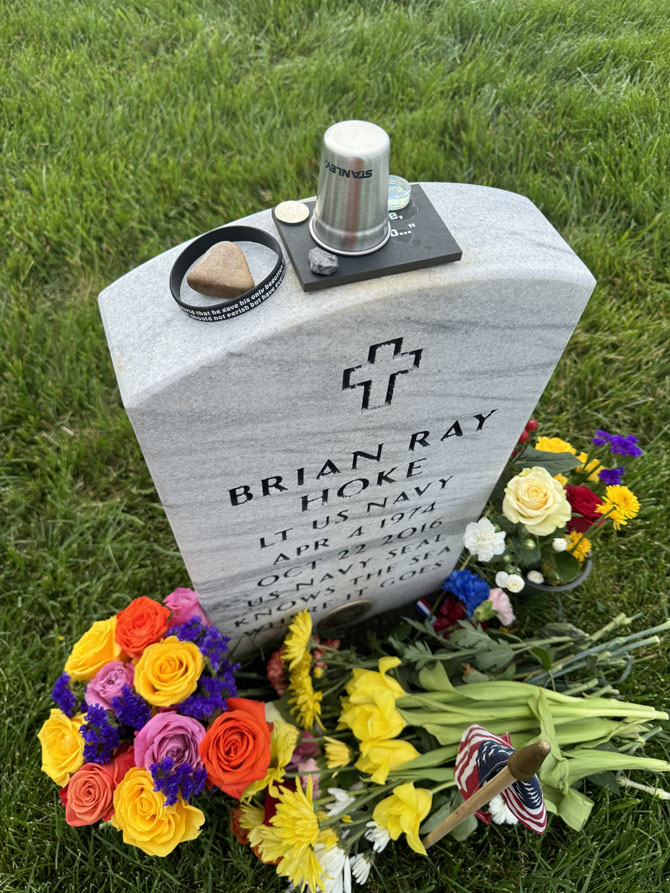Boy Scout Troop 996 based out of the Methodist church in Fort Hunt, Va., volunteered at the Flowers of Remembrance event.

During the Vietnam War the coins were a way to honor service members and communicate a message of respect for family members. A penny means you visited the grave, a nickel means you went to boot camp with the person, a dime means you served with him/her at some point, and a quarter means you were there with them when he/she died.
Photo by Eden Brown
Smith was also grieving for another shipmate who died that day, Xavier Carter, known as “Zeer.” Carter was “very earnest, very sweet. He worked really hard. He kept a bright yellow sports car in Japan, where the Fitzgerald was based. He loved that little car.” Smith placed a penny, a dime, and a quarter on the two graves on Memorial Day because she was there when they died.
The merchant ship collision pierced Fitzgerald‘s hull below the waterline and flooded an enlisted berthing area, drowning both men and five other shipmates. The crew was able to save the ship, partially because they sealed off the compartment they were in, and brought it back to port in Yokosuka, Japan. The collision of Fitzgerald – and another similar incident the same year, resulted in the removal of a large number of Navy Pacific Fleet leaders and sparked an overhaul of surface warfare training, manning and maintenance.
A few graves away, Shawn Slape sat at the grave of her husband, James Slape. She had driven up from North Carolina with their cat, to sit with him for a while. Shawn thought he’d be upset to be the center of attention but she wanted to remember his sacrifice. “He was part of the one percent across all the services who get chosen for the tough job of bomb disposal. He was in Afghanistan when defusing a bomb, he was blown apart from the waist down. He was so pretty. I insisted on seeing him one last time before he was buried, and they made an effort to dress him in a dignified way, and he was still pretty. I already knew what I was getting into when I married him but I loved him for being willing to take the risk.”
At the other end of the row was Sandra Johnson-Carter, there to celebrate her son, Michael Carter, who died on duty. He was only 18, a fresh marine who volunteered for recruitment duty in his own hometown because he was so inspired by the Marines - he wanted others to enter the service. His car accident on the way to work resulted in his death because of a faulty X-Lite guardrail, she said. Johnson-Carter realized his death could have been prevented if the faulty X-Lites were fixed, and so she dedicated the next few years to getting the state of Maryland to do just that. In memory of a son who was just starting his life and already felt like a hero to her, she wanted his death to help prevent others from dying that way. She has formed a foundation and just provided the first scholarship to a deserving student.
Diane Moscatello, who was visiting the cemetery from Lyon, France, said, “I found it very moving to see so many veterans buried together in such a beautiful place. The flags and flowers show a lot of care for the fallen. In France, you have a ceremony when a soldier dies but that is it. Here, you feel yourself among other grieving people, you are part of something greater than your own loss. It’s really nice to have a place to come where there are others who are going through the same thing.”
The Memorial Day Flowers Foundation brought 140,000 flowers for its annual floral tribute at Arlington National Cemetery on Memorial Day.
“We are grateful to the American public and our floral importers, who ensure our fallen military heroes are honored every year,” said Ramiro Penaherrera, the executive director of the Foundation. “Every year, this event expresses the patriotic spirit of so many Americans. Many of the floral importers donating flowers are immigrants to the United States who are grateful for this nation and the freedoms it offers.”
Ami Neiberger, who volunteers at the event, met Penaherrera in 2013 when he gave her a flower to place on the grave of her brother, Christopher Neiberger, who died in Iraq at age 22. She explained how the event got started: “Penaherrera is an American who lives in Ecuador and owns a flower farm. He and some other businessmen were at a Ecuador-American Chamber of Commerce lunch - it was right after Osama Bin Ladin was killed and they talked about all the wars in that region. They wanted to express their patriotism. He initially brought 10,000 roses in 2011.”
Neiberger is one of the 500 volunteers who came to Arlington cemetery to sort and place flowers. “Some volunteers are military, and they bring their kids to show them this is what you do. Some just come to help honor the fallen. It takes a little time because they go up with a bucket of 150 flowers. As they go along the row, they read each name and put down a flower and often say thank you. It shows that someone came by. It connects people to their history and reminds them of the sacrifices that have been made.”
To learn more about Flowers of Remembrance, see: https://memorialdayflowers.org/
To learn more about the Michael Anthony Carter Foundation, see: https://pfccarterjr.org/about-us/
